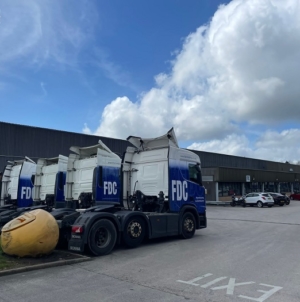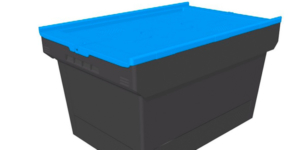-
ROSSLARE EUROPORT TARGETS HEALTH & SAFETY WITH CAMERA TELEMATICS PARTNERSHIP - 2 days ago
-
Landmark Study Reveals Wearable Robotics Significantly Boost Safety and Efficiency in Industrial Environments - July 24, 2024
-
Visku Tackle The Retail Seasonality Challenge One Pallet At A Time - July 22, 2024
-
KAMMAC AND BERGEN LOGISTICS STRENGTHEN FASHION & LIFESTYLE SERVICES IN THE UK - July 19, 2024
-
TENTBOX EXTENDS PARTNERSHIP WITH ARROWXL TO SUPPORT INCREASING DEMAND - July 17, 2024
-
The Perfume Shop improves customer journeys while driving profitability in partnership with Scurri - July 17, 2024
-
ZEROMISSION SECURES £2.3M ($3M) INVESTMENT TO ACCELERATE ELECTRIC FLEETS - July 16, 2024
-
BCMPA CELEBRATES SUCCESS OF 2024 CONFERENCE - July 15, 2024
-
Best of the Best: Jungheinrich Celebrates Triple International Award Win - July 12, 2024
-
GOPLASTICPALLETS.COM CALLS ON NEW CHANCELLOR RACHEL REEVES TO CONSIDER PLASTIC PACKAGING TAX REFORM - July 10, 2024
Trash talk: how waste management could become an engine for business growth.
Stephen Cameron, Business Development Director, SWRnewstar lifts the lid on the cost – and the opportunity – of waste to UK businesses.
If someone told you that waste management was a hidden engine for business growth, you’d probably think they were talking rubbish. You’d be right. Though in this case, it’s the kind of trash talk that can save money and fuel profit. Confused? It’s all about broadening the focus. Waste management is often a low priority or narrowly defined as an exercise in corporate social responsibility – an obligation that reflects businesses’ moral duty to safeguard the environment. Yet it has the potential to be so much more. The way your business manages its waste is not simply about facilitating a sustainable environment, it can help drive a sustainable business too. But only if it’s approached in the right way.
For many years, UK companies’ waste management strategies have typically focused on the cost of removing the waste they generate. But the real opportunity comes from focusing on the processes in your business that lead to waste being generated in the first place. If you can minimise those, the purchasing costs reduce, this combined with a decrease in the cost of disposal means that your business immediately becomes more profitable.
The scale of the opportunity is laid bare by the numbers. The Chartered Institute of Procurement and Supply estimates that waste disposal typically costs a business around 5% of turnover. However, with a high percentage of waste considered avoidable, the successful reduction of it naturally leads to a fall in disposal costs. For example, 75% of food waste is either edible or usable; that’s a whole load of money being spent to fill bins, compounded by the additional expense of disposing of it. It’s a similar story across most sectors. Yet by focusing on waste holistically, rather than as an inevitability, it’s possible to make significant up-front savings that lead to major downstream gains on the P&L. It’s a compelling hypothesis. But to exploit the opportunity – and fuel the hidden engine for business growth – you may need to rethink your current approach to waste management. As the cost of waste increasingly hits our planet and our businesses, perhaps it’s time for a change of mindset? Let’s talk rubbish.
China crisis: a catalyst for change
With green issues continuing to dominate the news agenda in 2018, there’s renewed scrutiny of how UK companies dispose of their waste materials. However, if you think your business has got a handle on its waste management responsibilities, you may well need to think again. The journey to a circular economy is forever littered with change.
One of the most impactful recent developments is what’s currently happening in China – historically the world’s largest importer of waste. In January 2018, the Chinese government introduced a clampdown on the kind of waste it will receive – strictly limiting the importation of 24 categories of solid waste including certain types of plastics, paper and textiles. This move has not only shaken the global recycling industry, it’s provided a wake-up call for all UK businesses too. After years of adapting practices to fulfil their Waste Hierarchy responsibilities, companies once again need to review the waste they generate and the processes they have in place to dispose of it.
This may be a blessing in disguise. The re-evaluation of waste management strategies presents companies with an opportunity to eliminate wasteful practices, reduce costs and turbo-charge profitability. But only if they consider more flexible models of waste disposal.
Challenging the common model
The most common waste management approach for many businesses is to outsource a solution to a national, ‘wheels-based’ provider. These well-known providers have built their business model around the ownership of large fleets of industrial refuse vehicles that operate across a national network. At first glance, outsourcing to national players appears a logical approach, particularly for companies in industries known to generate high amounts of waste or for organisations who operate across multiple sites and multiple geographical regions. Yet the wheels-based model can be inflexible and generate avoidable costs. For example, national providers typically dictate the timings of waste collections based on fixed local timetables. This creates a challenge for businesses who need to ensure that collections coincide with the times they’re likely to have generated the most waste. After all, the price of lifting a half-full bin is no different to the price of lifting a full one. However, the rigidity of the wheels-based model means that businesses can sometimes be forced to increase the frequency and volume of collection, incurring additional cost in the process. Paying for unproductive or unnecessary bin lifts is a false economy.
Shifting the focus
Organisations are understandably keen to drive down the cost of waste management. However, in their attempts to achieve this, they can sometimes focus on the wrong area. There’s a common tendency for procurement teams to benchmark providers on a crude metric of ‘price-per-lift’. This creates tendering processes that are narrowly focused on disposal costs and that typically culminate in contracting the provider with the lowest price-per-lift.
However, the true cost of waste in a business is not limited to the price of taking it away. On the contrary, the majority of that cost is often buried in long-standing processes embedded within a business that create waste in the first place. And much of it is avoidable. Rather than simply focusing on the end-game of collection and disposal, the smartest waste management providers will take a more holistic view and work with you to identify wasteful practices that fuel avoidable waste.
The holistic approach requires a mindset shift that treats waste management as an opportunity to boost the bottom line, rather than simply as a cost. By evaluating what you are putting into your bins and where it’s coming from, it’s possible to identify the parts of your business where new processes or different behaviours can help cut costs and reduce waste. It’s then far easier to tailor waste management solutions that reflect the real-world needs of your business. The downstream benefits of a comprehensive end-to-end audit of all your processes are potentially huge. It’s possible to reduce the number of bins you need, change the make-up of your bin configurations and limit the volume and frequency of bin lifts. What’s more, in addition to reducing your operating costs and increasing profits by eradicating wasteful practices, these adjustments can significantly reduce the overall costs of your waste management.
The partnership approach
So how do you unlock the opportunity? The most progressive businesses are looking beyond fixed and inflexible national solutions and deploying broker-led models of waste management. Brokers typically have access to a wide network of trusted partners and local providers that can custom-design flexible solutions irrespective of location or waste type. Moreover, the very best will partner with their clients to ‘lift the lid’ on their businesses and identify opportunities to eliminate unnecessary or uneconomical spend on waste.
As the impact of waste on our world continues to grab headlines, the time has come for UK companies to view waste management not as a cost or a commodity, but as an opportunity. Through collaboration and creative thinking, it’s possible to improve your business sustainability and your long-term environmental performance.
The way your organisation manages its waste can indeed be an engine for growth. But to get there, you may just need a change of mindset. Let’s talk rubbish – together.

































